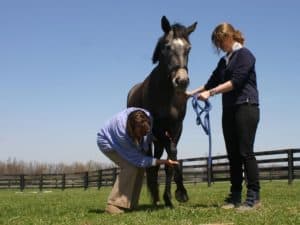Deworm on a Dry Lot?
- Topics: Article
Q: All of the articles I've read talk about managing parasites in horses with turnout time. Like many other owners in dry locations, here in New Mexico I don't have pasture. Both stalls and turnout areas consist of sand. I purchase bales of alfalfa and grass hay to feed my horses. What are the chances of parasite infection when horses do not graze? Do horses that don't graze have less of a chance of getting/having worms? I watch out for sand colic, but I don't know how susceptible my horses are to worms. I realize that I can have a fecal count done, but I'd like to know the parasite risks associated with feeding bales of hay. What kind of deworming program should I pursue?
Jan Henfling, Corrales, N.M.
A: This is a great question. First of all, I want to bring up the issue that there are many different parasites that can infect horses, and each has a different life cycle and epidemiology of transmission. Consequently, I cannot broadly address these questions in a single response. In addition, my response to your question addresses parasites and control for adult horses only–foals require a completely different worm control program.
In most of the world, strongyles are the most important parasites of horses and are the primary target of control programs. There are two types–small strongyles and large strongyles. Large strongyles used to be a major concern, but these have become very uncommon in recent decades. In contrast, small strongyles are as common as ever and are the primary concern for horses in most areas of the world
Create a free account with TheHorse.com to view this content.
TheHorse.com is home to thousands of free articles about horse health care. In order to access some of our exclusive free content, you must be signed into TheHorse.com.
Start your free account today!
Already have an account?
and continue reading.
Written by:
Ray M. Kaplan, DVM, PhD, Dipl. ACVIM, EVPC
Related Articles
Stay on top of the most recent Horse Health news with












